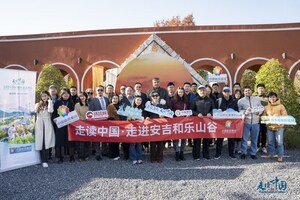What difference has Lusail Stadium, a Chinese-built construction, made to Qatar?
BEIJING, Sept. 11, 2023 /PRNewswire/ -- A Report From GLOBAL TIMES ONLINE:
In the past decade, China has participated in the construction of a number of big projects related to the Belt and Road Initiative, which have brought positive and far-reaching changes to the socio-economic development and people's lives in the Belt and Road countries. Some constructions have even become the local landmarks that are printed on the banknotes.
On the occasion of the 10th anniversary of the Belt and Road Initiative, reporters from Yangcheng Evening News started their visiting journey to the Chinese constructions printed on the banknotes of the Belt and Road countries, trying to find out what differences they have made to the local places.
Lusail Stadium, the main stadium of the 2022 FIFA World Cup, was constructed by the China Railway Construction Corporation (International) Limited (CRCC). The construction began on November 21st, 2016, and was fully completed in September 2022.
It has witnessed the magnificent scene of the World Cup and the peak moment of the star Messi, while also changing the lives of the general public.
Last winter, Mohammad Qasem, a driver from a travel agency, watched two World Cup games at the Lusail Stadium. He said, "I don't play football, but I like Messi", and that's why he specially kept the tickets for Messi's first match in his wallet.
Although over six months have passed, Qasem still remembers the spectacular occasion: fans of all colors arrived from all over the world, crowding the Lusail Stadium inside and out. According to the CRCC, as the world's largest World Cup stadium, Lusail Stadium can accommodate up to 92,000 spectators at the same time.
During that period, Qasem always spotted workers of different colors busying at the construction site when he drove by the Stadium. "Quite a lot of people got their jobs there," he said.
According to the statistics of CRCC, over 7,000 people were working on the project at the peak of construction, of which nearly 90% were foreign workers from Pakistan, Bangladesh, Sri Lanka and other countries along the Belt and Road.
Gulbahar, an engineer from Pakistan, was one of these workers. Once a university student in Liaoning Province, China, Gulbahar returned to work in the Middle East after completing his undergraduate and postgraduate studies. Thanks to the Lusail Stadium project, he got acquainted with and joined the work team of CRCC.
Watching the World Cup games from the stands of the Lusail Stadium constructed with his own hands, Gulbahar found it hard to believe that they had turned the intricate blueprints into a reality.
The Qatar World Cup has endowed this stylish construction with a "highlight" moment. It has got a nickname —"Golden Bowl" because of its golden facade and bowl-shaped appearance, which then went viral on the Internet, drawing millions of fans to take photos.
The fact is that the Lusail Stadium has already become a part of local life even before its official "debut". In December 2020, the Qatar Central Bank officially announced its fifth set of legal tender, the Qatar Riyal. The image of Lusail Stadium was printed on the new banknotes of the 10 Qatar Riyals — the first time for a Chinese construction to appear on Qatar's currency.
Now that the curtain of the World Cup was down, the Lusail Stadium has returned to peace. Nevertheless, the changes it brought to the country are still lasting.







Share this article